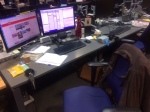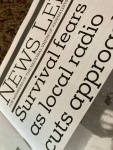It is with a heavy heart that I write this. As a raw radio hack I graduated from the London College of Printing in 1982 – a training ground for some of the best local radio talent of that generation. I worked in BBC Local Radio for the next two decades: at Leicester, Lincolnshire, Derby, York and Leeds. I went on to teach radio journalism and have freelanced at the BBC over the past half-decade.

In the first half of 2023 I’ve seen how BBC Local Radio is being made to do a handbrake turn into what could become linear-listener isolation, how dozens of colleagues are really upset about the way they’ve been treated, and how their jobs and experience are being sacrificed. I am not alone in asking why this change is happening.
Elsewhere, I recall how since the turn of the century commercial radio, originally known as Independent Local Radio (I’ve worked there too) has all but disappeared, and the local commercial competition has morphed into a chain of identikit pre-recorded automated digital services.

For an insider’s view, read Tony Stoller (2010), Sounds of Your Life: The History of Independent Radio in the UK, New Barnet, Hertfordshire: John Libbey.
For a cultural context read my book, Martin Cooper (2022), Radio’s Legacy in Popular Culture: The Sounds of British Broadcasting over the Decades, New York: Bloomsbury Academic. https://www.bloomsbury.com/uk/radios-legacy-in-popular-culture-9781501360435/

And I wonder why senior managers at the Beeb have seen fit to damage their own local offerings just when the radio playing-field was clear for them to steam ahead. The mixed metaphor was intentional just there.
This piece seeks to underline and amplify the already excellent analysis and criticism by the likes of Liam McCarthy, and the team at Radio Today including Roy Martin and Steve Collins https://radiotoday.co.uk/industry/.
Indeed, this piece uses their original stories and comment and brings them together to share the awfulness of the Beeb’s 2023 Local Radio Blood-on-the-Carpet episode.

In particular, Liam’s piece from May 2023 – which probably, sadly, amounts to a valedictory – is beautifully written. https://radiotoday.co.uk/2023/05/former-managing-editor-dr-liam-mccarthy-writes-to-tim-davie-over-bbc-local-radio-changes/. I commend it to you.
The new slimmed-down BBC Local Radio schedules start from the Autumn of 2023. [For a Sept ‘23 update click here.] [For the Oct ’23 news latest click here.] [November ’23 is here], [and December 2023 is at this link].
Each station will have local programmes only from 0600 to 1400 weekdays. Afternoon, evening and weekends will be shared regional shows, with an all-England late-night show. News will be “local”, but I await to hear what that sounds like coming out of the radio loudspeaker.

Local-ness is what BBC Local Radio is all about. When, for example, at Leicester I learnt how to pronounce Belvoir Street (easy for me, I was born in the city); at Derby it was Alrewas and Heanor that were the challenge; at Leeds it was Slaithwaite and Haworth that could trip us up, and at York it was often Masham. But it’s a key point: local presenters live in the locality. They’re one of the listeners and the audience knows and respects that.

wikimedia.org/wiki
/File:Mark_III_radio_desk.jpg
And I’m saddened at how the new national late shows were announced – apparently it was a leak not a proper staff announcement: https://radiotoday.co.uk/2023/07/becky-want-and-jo-good-to-host-new-local-bbc-radio-late-show/
Again, I wonder why the changes of 2022-23 were even dreamt up. I recall working with one station manager in the 1990s who, when it came to wacky ideas for schedule changes, used to chuckle “If it ain’t broke, don’t fix it.” How true.

Adam Christie is a journalist and a member of the NUJ’s Leeds and West Yorkshire Branch. I also belong to this branch. Adam edits the members’ monthly industry newsletter. In a recent article he said,
“…local radio allows communities to talk to one another. News is important, but [BBC] local radio has become so well established over the years that it is now far more than that. It’s about local organisations and community groups being able to tell people what they’re doing and why. That is being taken away.”
Later, Adam told me that BBC Local Radio is also about “school closures in the snow, ‘warm banks’ during the cost-of-living crisis, pastures for cattle when fields are flooded and ewes who can be step-parents for orphaned lambs…” Absolutely.
The National Union of Journalists’ branch published research in early July which questioned the legal framework behind the proposed merging of stations’ output. Read it here: https://radiotoday.co.uk/2023/07/bbc-local-radio-plans-could-potentially-breach-operating-licence/

And, of course, as well as news and information BBC Local Radio is also about local music. Its 32 versions of BBC Introducing https://en.wikipedia.org/wiki/BBC_Music_Introducing have, since 2007, entertained listeners on each station with the sounds of local new bands – and many stars have emerged from the woodwork. Florence and the Machine, Ed Sheeran and George Ezra for example.
So important is the impact of Local Radio that Glastonbury has had a BBC Introducing stage for a number of years.
And stars such as Nile Rodgers, Ronnie Wood and Sir Elton John have pledged their support for BBC Local Radio. https://radiotoday.co.uk/2023/07/nile-rodgers-supports-campaign-against-local-bbc-radio-changes/ and https://radiotoday.co.uk/2023/05/ronnie-wood-joins-the-fight-to-keep-bbc-local-radio-local/ also see https://radiotoday.co.uk/2023/08/sir-elton-john-voices-concern-over-local-bbc-radio-changes/ It means a lot when titans of funk, rock and pop speak out about something like this that’s so close to their hearts.

Martin Cooper
In a moment, I’ll have the opportunity to honour some great broadcasting colleagues, but let me begin with a bit of back history.
The BBC’s Digital First strategy was initially announced in the spring of 2022 https://www.bbc.co.uk/mediacentre/2022/plan-to-deliver-a-digital-first-bbc/
Early in 2023 the BBC began to offer redundancy in order to cull the roster of BBC Local Radio presenters across England. Some presenters in their 30s took the opportunity to take the money and go freelance. I know of one who’s doing shifts at Times Radio; another is working at Sky News Radio (aka IRN).
A few others, in their late 50s, have chosen unexpected early retirement. Listeners are already missing their favourite local voices. Many, who were faced with having to submit a demo tape and apply for their own jobs after decades of popular daily shows, felt as if their experience and close connection with the audience counted for nothing.

/wiki/File:Paqt_
meter.ab.png
In April the Labour MP for Hull North, Dame Diana Johnson, told the House of Commons that BBC staff were being threatened with gagging clauses and could lose redundancy pay if they spoke out about the planned cuts. It was something the BBC denied. https://radiotoday.co.uk/2023/04/bbc-local-radio-strike-suspended-and-mp-blasts-bbc-management/
The National Union of Journalists launched a campaign, Keep BBC Local Radio Local. Members across the country went on strike on the 15th of March 2023, budget day. The Union’s campaign – with more days of withdrawn labour – continued since then. https://www.nuj.org.uk/resource/keepbbclocalradiolocal.html
By late July 2023 some sections of BBC Local Radio began to look a bit like the Marie Celeste. One station had gone from 11 experienced and popular presenters down to 3, at another station there were two left, and at a third there was only one staying on.
BBC Local Radio has a potential audience of 46 million listeners. What are they likely to miss? It strikes me that what with 40-odd BBC local Radio stations, each serving a discrete geographic audience, there is what amounts to a divide and rule effect. The cries of protest at the changes are not reaching a national intensity of any scale compared to if they were planned for a national station like BBC Radio 4. Remember, years ago, when Woman’s Hour moved to ten o’clock in the morning?

What follows is a rollcall – in date order – of some locally distinguished names. Each has served their communities with dignity, with integrity and proved to be popular with their audiences. If I’ve missed anyone, or if there’s a colleague you’d like to honour, drop me a note in the comment box below. All comments are moderated, and you can remain anonymous if you so wish.
I’ve included the dateline and the full web address of each.
April 14th, 2023, https://radiotoday.co.uk/2023/04/bbc-radio-devon-presenter-david-sheppard-to-leave-the-station/
April 22nd https://radiotoday.co.uk/2023/04/marie-lennon-to-step-down-from-bbc-radio-wiltshire-show/
April 28th https://radiotoday.co.uk/2023/04/caroline-martin-announces-her-departure-from-bbc-radio-wm/
April 28th https://radiotoday.co.uk/2023/04/burnsy-shares-hell-no-longer-be-needed-at-bbc-radio-humberside/
This piece by broadcaster Nicky Horne on April 28th expressed perfectly the awfulness of what was being planned. Nicky has decades of experience in radio, both ILR and BBC. He writes here from a position of wisdom and authority: https://radiotoday.co.uk/2023/04/it-didnt-have-to-be-like-this-local-bbc-radio-cuts-by-nicky-horne/
April 30th https://radiotoday.co.uk/2023/04/bbc-radio-nottingham-daytime-host-mark-dennison-to-depart/
May 2nd, 2023, https://radiotoday.co.uk/2023/05/den-siegertsz-leaving-bbc-radio-stoke-after-27-years-on-air/
May 2nd https://radiotoday.co.uk/2023/05/andy-comfort-unsuccessfully-applies-for-his-own-bbc-radio-job/
In what I suspect was a sleight-of-hand, and a subtle act of rebellion to express their anger, local journalists at York managed on May 4th to get BBC online to publish a story about mid-morning presenter Jonathan Cowap leaving. https://www.bbc.co.uk/news/uk-england-york-north-yorkshire-65485074
And you can listen to the last bit of Jonathan’s final show on May 11th here. A sad day, and a dignified exit. https://aircheckdownloads.com/uk-airchecks/bbc-radio-york/2020s/jonathan-cowap-may-11th-2023-309
Jonathan starts a daily weekday show on York’s community station YO1 Radio in September 2023.
May 16th https://radiotoday.co.uk/2023/05/melvyn-prior-to-leave-radio-lincolnshire-after-32-years-at-the-bbc/
May 17th https://radiotoday.co.uk/2023/05/neil-green-has-hosted-his-last-programme-on-bbc-radio-tees/
On May 18th staff at the newsroom in BBC Surrey managed to get this published on the Corporation’s website. https://www.bbc.co.uk/programmes/p0fp0b2s
May 19th https://radiotoday.co.uk/2023/05/bbc-cuts-song-to-be-released-about-keeping-local-radio-local/
May 22nd https://radiotoday.co.uk/2023/05/mark-cummings-is-going-from-bbc-radio-gloucestershire/
By mid-May 2023 questions were being asked in writing and on national radio. Here’s an update on that open letter from Liam McCarthy https://radiotoday.co.uk/2023/05/liam-mccarthy-provides-update-following-letter-to-tim-davie/
And on May 23rd there were some tough questions on BBC Radio 2’s Jeremy Vine Show: https://radiotoday.co.uk/2023/05/jeremy-vine-questions-rhodri-talfan-davies-over-bbc-local-radio-changes/
May 31st https://radiotoday.co.uk/2023/05/tim-wheeler-has-hosted-his-last-show-on-bbcradio-northampton/
May 31st https://radiotoday.co.uk/2023/05/george-smith-to-host-his-last-show-on-bbc-radio-york/
May 31st https://radiotoday.co.uk/2023/05/steve-barker-exits-bbc-radio-lancashire-after-45-years/
On June 13th, 2023, the BBC News website reported on the Corporation’s director general, Tim Davie, appearing before MPs and defending “painful” local radio cuts. Also, this piece reports on the indignity, according to one MP, of radio presenters having to “‘sell themselves in 60 seconds’ to save their careers, and to make demo tapes that managers never accessed” https://www.bbc.co.uk/news/entertainment-arts-65889239
Elsewhere, Roy Martin of Radio Today made these observations. The headline cuts to the chase: https://radiotoday.co.uk/2023/06/is-tim-davie-becoming-the-mr-beeching-of-local-radio/
June 22nd https://radiotoday.co.uk/2023/06/bbc-radio-wms-caroline-martin-takes-time-off-to-clear-her-head/
Also on June 22nd, questions were being asked in the House. The House of Commons library prepared this report ahead of the debate: https://commonslibrary.parliament.uk/research-briefings/cdp-2023-0136/. Two days after the Commons debate Radio Today provided this detailed summary of the exchanges: https://radiotoday.co.uk/2023/06/parliament-local-radio-debate-the-bbc-will-ignore-this-motion-at-their-peril/
And on the same day, former senior managers joined in with their views: https://radiotoday.co.uk/2023/06/former-bbc-director-general-lord-hall-joins-local-radio-debate/
July 7th https://radiotoday.co.uk/2023/07/bbc-radio-cambridgeshires-jeremy-sallis-to-leave-the-station/

One thing that’s been noticeable in the past couple of years, since just before the pandemic of 2020-21, has been the music played on BBC Local Radio stations across the country. Computer networking technology means that each station now has the same core music playlist. All the audio is now stored in one of two data centres.
July 17th https://radiotoday.co.uk/2023/07/faye-hatcher-announces-last-show-on-bbc-radio-gloucestershire/
And audio of Faye here (from BBC Sounds!) https://www.bbc.co.uk/sounds/play/p0g127tf
By August 3rd, 2023, we began to get details of the regional sustaining services. Spool to the bottom of this link for details of Sean Dunderdale taking the Lincs/Humbs shared weekends show from 1000-1400. https://radiotoday.co.uk/2023/07/scott-dalton-to-return-as-host-of-bbc-radio-lincolnshire-breakfast/
It’s a combined area that stretches from Bridlington in the north to Market Deeping in the south. That’s a three hour drive via the A15. I’ve known Sean since the early 2000s when he was head of news at the LincsFM group. He gave me freelance news reading shifts for many years across the stations of the group. He’ll do a great job at weekends.
August 9th and there’s some changes at BBC Radio Merseyside: https://radiotoday.co.uk/2023/08/paul-salt-announces-exit-from-bbc-radio-merseyside-breakfast/
Finally, I do wonder how local “out-of-hours” events will be covered in the future.
Two episodes from my own radio experience emphasise the importance of BBC Local Radio being right there, on hand, in the community.
I recall a fire at the telephone exchange in Scarborough – which affected the 999 service – in the early 1990s (before the widespread use of mobile phones), and how BBC Radio York stayed on air with presenters taking on extra shows to channel emergency news to listeners in the resort. For example, where to run and find one of the fire engines out on standby on nearby street corners if a blaze broke out in your home in the middle of the night.
I also remember the call-out to report the 1989 Kegworth air crash on a Sunday evening. Three BBC Local Radio stations, Leicester, Derby and Nottingham combined reporting and presentation staff to give live news of a developing emergency. I recall standing on a bridge over the M1 and looking down at the embankment on that cold January night. The British Midland Airways Flight 092, a Boeing 737-400, lay there torn open on the grassy verge of the motorway. 47 people died and 74 sustained serious injuries.
I wonder where the potential to cover such incidents will be in the future. [For a September 2023 update click here.] [For the Oct ’23 news latest click here.]
Great article Martin Cooper.
LikeLike
Thanks for that comprehensive round-up of the demise of BBC local radio services, Martin. It’s so depressing. Inevitably the BBC will send some bo***cks talking exec who’ll try to convince listeners that the cuts to reporting and presenting staff will improve local radio output. That such a fantastic local and regional public broadcasting service can be butchered without public consent is appalling.
LikeLike
Radio Merseyside’s ‘Retro show on Sundays 2 – 4 p.m. is the only music show that does not follow the country’s static playlist but actually plays listeners requests across three super decades, the 50’s,60’s and 70’s. It would be a big mistake for the BBC to remove it from the schedules
LikeLike
Thanks Martin, powerful piece. And for the detailed links – look forward to following a few up…
LikeLike
Hi Martin
Good work, most bbc local radio don’t know what is about to happen.
I produced and presented On the Wire, a leftfield music show, on BBC Radio Lancashire for nearly 39 years, finished at end of May. Now on Slack City Radio out of Manchester, Brighton, Norwich and Portsmouth and growing, independent ad-free out via the DAB multiplexes and on the net via totallyradio.com
Best
Steve
LikeLiked by 1 person
Ten Years ago the whole of the radio industry were sneering at Community radio stations – Now in many towns they’re the only truly local radio left standing. It’s shameful they are not allowed to be funded properly and are starved of financial support. They could have filled the gap being left much better if they had been allowed even a tenth of the money the licence fee payers have been forced to pay so called “Local” BBC stations…..
LikeLike
Martin, a seriously comprehensive round up of this sorry tale, thus far.
One area that continues to astound me is the lack of accountability or engagement in public debate by any of the three main protagonists, namely Talfan Davies, Horton and Burns.
The latter didn’t even bother to respond to a request from BBC Radio 4’s Feedback last week on the impact of these cuts on new music. (See https://www.bbc.co.uk/sounds/play/m001pfps?partner=uk.co.bbc&origin=share-mobile) As could be said of so much in Britain today, where is the accountability?
LikeLiked by 1 person
Stephen Bumfrey’s last day on Norfolk today. I think 22yrs this time plus previous spells in the 80s and 90s.
LikeLike
Ahhh BBC local radio. If they weren’t in the process of destroying it, they’d be creating it. Each wave of management sets out to make its mark. Alas this bunch is into destruction; in effect they have set out to become cultural and social vandals. But there will be another lot in due course and if the BBC survives the fiscal attack from the right, then they will proclaim themselves as saviours and start the rebuild. Better times (probably) lie ahead.
LikeLike
Too late
LikeLike